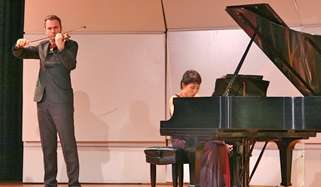|
Back
East Europe in the Hills of Vermont Boston
Arkell Pavilion, Southern Vermont Arts Center, Manchester, Vt.
08/15/2013 -
Antonin Dvorák: Quintet for Piano & Strings no. 2 in A Major, Opus 81
Astor Piazzolla: Five Tango Sensations: “Anxiety” – Oblivion
Pancho Vladigerov: Bulgarian Rhapsody “Vardar”, Opus 16
Béla Bartók: Romanian Folk Dances, sz. 56
Pablo de Sarasate Navarra
Claude Debussy: Preludes for Piano (Book II): “Feux d’artifice”
Vittorio Monti: Czardas
Stefan Milenkovich, Joana Genova (Violins), Ariel Rudiakova (Viola), Caroline Stinson (Cello), Di Wu (Piano), Rocco Anthony Jerry (Bayan)

S. Milenkovich, D. Wu (© Deanna Baasch/Manchester Music Festival)
The eminent New England music critic Jim Lowe noted with some dismay that summer classical music festivals in New England “are multiplying like Starbucks’ in Seattle.” And even the peripatetic Mr Lowe admits he can cover each festival only once, since they’re percolating like... well, like those coffee beans.
Starbucks, though, are designed with appalling uniformity. The festivals throughout the hills and valleys and lakes throughout New England reflect not only the musicians, but the landscapes, the audience preferences, the audacity of the programmers and, inevitably, financial limitations.
The secret, though, is that some have been in existence for decades–in Manchester’s case, 40 years–and New York friends in the business insist I’m thinking of the BBC in Manchester, England, ignorant of any other Manchester. (Sigh.)
This village, though, an hour from the old marble-quarrying city of Rutland, is not exactly your quaint plain-speaking Vermont town. The shopping street resembles a truncated Beverly Hills Rodéo Drive (outlets, from Armani to Banana Republic), moderate-sized houses can sell for a million bucks (used by retired Florida residents in the summer), a country club is on the main road, other woody and faux-rustic mansions are atop the verdant hills overlooking the town.
Yet during these four decades, the Manchester Music Festival has advanced in different ways. It isn’t star-studded like Marlboro or Tanglewood, but the young musicians (they have a special Young Artists group) and the older pros are more than competent in their chamber music. This year, they have included not only Met Opera performers on the weekend, but superstar Audra McDonald will headline the final concert on August 25.
They also have year-round educational programs, and a touring orchestra, which I haven’t heard yet but certainly will catch October 6th at BargeMusic. As for the programing, the concert I went to last Thursday was far more unusual than one would catch in the usual summer festival.
In one way, it was catering to an audience out to catch some evening “entertainment”, since the second half was highlighted by many a Balkan dance tune. On the other hand, those “tunes” were written by Béla Bartók, Pablo de Sarasate and the great Bulgarian composer Pancho Vladigerov, so this was hardly cheap dance music.
And to begin the program, one of the great composers of Central Europe, Antonin Dvorák was produced with his fresh lovely A Major Quintet.
The five performers are excellent in their own right. Di Wu is an astonishing pianist, filled with energy (an energy later given electrifying volition in a Debussy Prelude.) Joana Genova was heard a few weeks ago at the Sevenars Festival doing a Dvorák trio. The others were new to me, but would soon show their stuff.
Singular as they are as soloists, this Dvorák started with a lugubrious opening theme (the composer can be tragic, but lugubriousness is not his style), and even the bouncy Dumka lacked the Czech beat. They did redeem themselves in the Scherzo, not played molto vivace, but with a crisp transparency. And the center section was simply idyllic.
In America, the composer tried to avoid the patrons who sponsored him, and his best friend was an African-American violinist, Which is why the finale, to me, sounds like an American Joplin-style two-step. Of course it isn’t, but these five gave it all the exuberance needed.
That second half, though, was far more original, and the well-heeled informally-dressed Manchester audience enjoyed it to the full. I’m uncertain whether Astor Piazzolla would have found the beat in his two works, but he would have approved the use of the bayan, a variant of Piazzolla’s bandoneon (thus the Central European connection, since the instrument itself was invented in the Ukraine).
The next works were unquestionable audience favorites–and for this writer as well. Joana Genova and Di Wu played an arrangement Pancho Vladigerov’s Vardar from the Bulgarian Rhapsody. True, it resembled Enescu’s Romanian music more than the Ottoman/Turkish music of Bulgaria, but it was lively. Add to that the very showy Stefan Milenkovich–whose introduction was almost longer than the Béla Bartók Romanian Dances. Whatever Mr. Milenkovich’s nationality, this was pure Central European ardor.
Add to that now the “dueling fiddles” where the two played a piece by Sarasate, and the entire ensemble finishing with a Czardas.
Manchester audiences, methinks make a conscious effort to get their monehy’s worth, when going out to a concert. And these choices here must have satisfied their quantitative desires. The actual quality of the artists was a priceless extra, but evidently a delicious icing for an extremely diverting evening.
Harry Rolnick
|